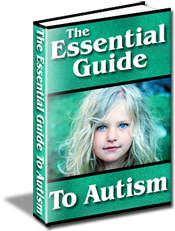Tips On Understanding And Living With A Child Who Has Autism
Click Here To Know The Simple Methods To Effectively Spot The 31 Signs of Autism
Growing up with a friend or a sibling who has autism can be frustrating if you don?t understand what having autism is all about for that friend or sibling.
Children with autism sometimes have a difficult time understanding what we say or what our facial and body expressions mean. You should not just stop trying to communicate with them because of this. Try showing them a picture or an object to help them understand things better. For example, if you are talking about the most recent basketball game at school, show them a basketball or a picture of the entire basketball team to help them understand what you are talking about.
To help you understand some of the behaviors common to kids with autism review the following list:
? Some kids with autism may have trouble talking and may make strange sounds, or they may not talk at all
? Some kids with autism may flap their hands, spin, or laugh a lot
? Some kids with autism will behave or play in unusual ways
? They may be very active or be very quiet and like to spend time alone
? They may have trouble looking directly at you
? Some kids with autism may say the same things over and over
Kids with autism, like all people, can get frustrated and angry. The difference is most often they cannot tell us why they are frustrated or angry. They may use actions instead of words to express their feelings.
A child with autism may make noises or spin around when he or she becomes upset, confused, or bored. When they are excited or happy they may flap their hands, jump up and down, or run in circles.
When surroundings or schedules change and/or things become different, many children with autism get upset. They may start to cry, hold their hands over their ears or run away. The reason children with autism react so differently to things that most of us do not even notice is because they have difficulty understanding or dealing with the world around them.
No one knows why some people have autism. There may be many different causes. Researchers continue to study and try to find out just what the causes of autism are and how best to help people with autism.
Kids with autism may be a member of your class or may be in a classroom that was set up especially for them. Some children with autism go to different schools; however, more and more children with autism today can go to regular schools and participate in after-school activities with classmates, friends and neighbors. This is so much better for the child with autism rather than continuing to separate them from the rest of the world.
Special arrangements may be used in classrooms to help a classmate with autism participate in the class. He or she may even have a special coach sit at their desk or table. He or she may use picture symbols to communicate with classmates and the teacher. There is special computer software that can ?talk? for a child with autism. The absolute best way for you to deal with a classmate, a friend or sibling with autism is to remain ?friendly.?
Autism is not a disease that is contagious. Others cannot catch autism from a classmate, friend or sibling.
Becoming a friend to a child with autism can be a rewarding and learning experience for everyone involved. Review the following ideas to help you be a friend to a child with autism:
? Accept the differences
? Protect your friend from things that bother him or her
? Talk to a child with autism in small sentences and use simple words with lots of gestures
? Use pictures or write down what you want to say to your friend who has autism to help him or her understand you better
? Join your friend who has autism in activities that interest him or her
? Be patient and understand that your friend does not mean to bother you or others
? Invite your friend who has autism to play with you and to join you in group activities
? Sit near your friend who has autism, and help him or her do things if they want you to
? Help other kids learn about autism by telling them about your friend
Source: Autism Society of America
Disclaimer: This article is for educational purposes only. It is not intended to be a substitute for informed medical advice or care. You should not use the information in this article to diagnose or treat any health problems or illnesses without consulting your pediatrician or family doctor. Please consult a doctor with any questions or concerns you might have regarding your or your child?s condition.
This article is FREE to publish with the resource box.
Connie Limon. Visit us at http://www.about-autism.info for more information about Autism Spectrum Disorder.
Labels: autism_fund_jewelry_raising, autism_knew_student_ten_things_wish, autism_mild_symptom, autism_seroquel, autism_sourcebook, autism_speaks.org, autism_world

